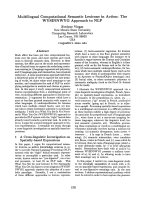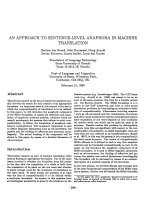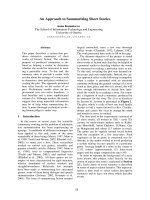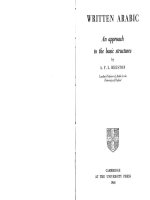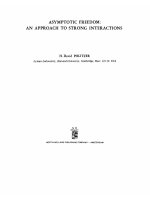Promoting European Studies in Vietnam as an Approach to Enhance Vietnam - EU Relations
Bạn đang xem bản rút gọn của tài liệu. Xem và tải ngay bản đầy đủ của tài liệu tại đây (216.98 KB, 8 trang )
<span class='text_page_counter'>(1)</span><div class='page_container' data-page=1>
8
Promoting European Studies in Vietnam as an Approach to
Enhance Vietnam - EU Relations
Phạm Quang Minh*
<i>VNU University of Social Sciences and Humanities </i>
<i>336 Nguyễn Trãi Road, Thanh Xuân Dist., Hanoi, Vietnam </i>
Received 19 March 2014
Revised 30 March 2014; Accepted 20 April 2014
<b>Abstract: The relationship between Vietnam and Europe can be traced back to four centuries ago </b>
as the first European missionaries set their feet in the country. However, the bilateral relationship
does not match and does not satisfy both sides. The main objective of the paper is to analyze the
development of European Studies in Vietnam from historical perspective by using the first hand
information collected in Vietnam. To this end, the paper consists of three parts. The first part
provides an overview of Vietnam - EU relations as the basis to understand its current situation.
The second part describes how European Studies in Vietnam have developed during last two
decades. The third part analyses some challenges for European Studies. The paper concludes that
the EU Studies program must be the number one priority in the bilateral relationship and must play
the role as an efficient instrument to boost better understanding of the EU.
<i>Keywords: International Studies, Area Studies, European Studies, European Union (EU) - Vietnam </i>
Relations, EU - ASEAN Cooperation.
<b>1. An overview of Vietnam - EU Relations*</b>∗
The relationship between Vietnam and
Europe can be traced back to as early as the 17th
century. Initially, this relationship was
characterized by the interaction between two
very different cultures and influenced
significantly by European colonial practices.
The first Europeans to contact Vietnam were
the British, Portuguese, Italian and French
missionaries. The British came into formal
contact with Vietnam in 1613 [1]. However,
they left the country after a few years. In January
1615, the Portuguese Jesuits Carvel and Goa
_______
∗<sub> Tel.: 84-904696062 </sub>
Email:
Buzoni landed in Tourane (Da Nang) and set up
a missionaries station in Faifo (Hoi An). In
1618, another Italian Jesuit, Cristoforo Borri
<b>arrived in Vietnam and published the very first </b>
report on the country in a European language
[2]. Yet another mission was established in
1629 in Tonkin (North Vietnam) and hosted a
French Jesuit Alexandre de Rhodes who was
credited with the conversion of 7,000 people to
Christianity [2] and the transcription of the
Vietnamese language into the Latin alphabet [3]
<i>The invention of the Quoc ngu (National Script) </i>
[4] was documented by de Rhodes in his works
<i>Dictionarium and Cathechismus (1651). </i>
</div>
<span class='text_page_counter'>(2)</span><div class='page_container' data-page=2>
European missionaries were persecuted and
Catholic books were burnt. Between 1848 and
1851, Kaiser Tu Duc (1848-1883) proclaimed
the end of all missionary activities in Vietnam,
and even offered a reward for any murdered
European. This hostile attitude triggered a
violent reaction from French Emperor
Napoleon III and in 1858 French military forces
landed in Tourane (Da Nang) and began the
conquest of Cochinchina (South Vietnam)
which fell under total French control in 1867.
However, it took another two decades until the
French completed their conquest of Annam
(Central Vietnam) and Tonkin (North Vietnam)
at which point Vietnam became a part of the
French empire until its independence in 1945.
The two Indochina wars (1946 – 1954 and
1965-1975) and the ‘bipolarity’ of the world
order induced by the ‘Cold War’ had a
significant impact on the relationship between
Vietnam and the European Community. In fact,
the ideological confrontation became a decisive
factor in this relationship between the two,
since most of the Community’s Member States
were close to the USA’s position at a time
(including foreign policy stances). As a result,
there was no official connection between
Vietnam and the European Community before
1990 (although Vietnam did have diplomatic
ties with individual EC member states).1<sub> </sub>
<i>The Vietnam’s reform policy (Doi moi) </i>
launched in 1986 and the end of the ‘Cold War’
in 1989 provided a chance for both sides to
improve relations. On October 22, 1990 - a
turning point in the relations between Vietnam
and Europe - the European Community
established official diplomatic relations with
Vietnam. Five years later, on July 17, 1995 the
two sides signed a Cooperation Agreement
which came into force on 1st<sub> June 1996 [5] and </sub>
_______
1<sub> The first EU member to establish diplomatic </sub>
relations with Vietnam was the Kingdom of Sweden
on January 11, 1969. France was the second EU
member which established its relations with
Vietnam on April 12, 1973.
provided a legal basis for the bilateral ties.
Since then, Vietnam - EU relations have
enjoyed stability and on-going diversification.
Based on the Cooperation Agreement, a new
mechanism for regular contact was created to
promote open dialogue, introduce initiatives
and plan cooperation. Impressive results have
been achieved in a relatively short period of
<i>time, not least due to the success of the Doi moi </i>
policy in the Vietnamese society and the
“combined efforts of the European Commission
and EU Member States” [6].
In the political field, the EU and Vietnam
have increased the frequency of high-level
meetings. One of the ‘milestones’ was the
first-ever Vietnam-EU Summit held in Hanoi before
the 5th<sub> Asia - Europe Meeting (ASEM5) in </sub>
October 2004. The President of the European
Commission and the heads of the EU Members
States participated. The two sides have also
maintained cooperation within the frameworks
of multilateral dialogues, such as ASEM and
ASEAN-EU. Reciprocally, Vietnam’s leaders
have paid official visits to EU Member States.
The frequent visits and meetings have helped
both sides to develop a better understanding of
each other, come closer together and find
consensus on differing issues in both bilateral
and multilateral relations. The EU highly
valued Vietnam’s achievement in economic
development, reduction of poverty and its
<i>determination to continue the Doi moi process. </i>
However, the views between the two sides still
diverge on issues such as human rights,
democracy promotion and freedom of religion.
</div>
<span class='text_page_counter'>(3)</span><div class='page_container' data-page=3>
the ‘Trans-Regional EU - ASEAN Trade
Initiative’ (TREATI) and the ‘Regional EU
-ASEAN Dialogue Instrument’ (READI). Both
programs were launched in 2003 to promote
economic and trade cooperation as well as
dialogue and regulatory cooperation between
the two organizations. Consequently, trade
between the EU and Vietnam has sharply
increased. In 2012, EU - Vietnam trade in
goods was estimated over €23, 8 billion, with
€18, 5 billion in imports from Vietnam into EU,
and €5, 3 billions in exports from the EU to
Vietnam. The EU is also one of the most
important investors in Vietnam, accounting for
an amount of €1.061 billion of FDI [7].
Supported by the EU, Vietnam became the
150th<sub> member of the World Trade Organization </sub>
(WTO) in January 2007. Responding to the
rapid economic development of Vietnam and in
accordance with the New Southeast Asia
Strategy (2004), the European Commission
(EC) issued a Country Strategy Paper for
Vietnam between 2007-2013 foreshadowing
long-term cooperation on the bilateral level.
According to this Paper, the EU will focus its
attention on selected sectors of cooperation,
including providing direct assistance to
Vietnam. Importantly, according to
Ambassador Marcus Cornaro, Head of the
European Commission Delegation to Vietnam,
“Vietnam enjoys an exceptionally good level of
government-led donor coordination; also,
harmonization within the EU and with other
major donors have progressed a lot.” [8].
Entering the new millennium, Vietnam -
EU relations have reached a new level. In 2007,
with 27 members and population of 500
million, the EU accounts for 30% of global
GDP and 41% of the total value of world trade
[9]. This extensive enlargement of the EU
offered new opportunities, as well as
challenges, for the Union’s external partners.
Like other less developed countries, Vietnam
has been concerned that the commitment of the
EU to help its new members might influence its
commitment to cooperate with developing
countries around the world. Despite these fears,
it seems that EU enlargement has not ‘diluted’
EU presence in and involvement with Vietnam.
On March 29, 2007, the EC’s Country Strategy
Paper (CSP) for Vietnam was adopted by the
European Commission. For implementation of
this CSP, the EU allocated €160 million for the
period of 2007 - 2010 and 144 million for the
period 2011 - 2013. In general, it is believed
that EU enlargement has created more
opportunities for Vietnam - EU relations
because the majority of the new EU members
used to have long-standing relations with
Vietnam during the Cold War. In a way, these
past links present Vietnam with a chance to
capitalize on the existing partnerships and to
expand cooperation. In addition, there is a big
Vietnamese Diaspora residing in Europe (there
are about 200,000 Vietnamese living in Eastern
Europe, with 100,000 in Germany, 20,000 in
Poland, 25,000 in Czech Republic and 5,000 in
Hungary) [11]. This “human link” serves as yet
another bridge between Vietnam and the
expanded EU.
One of Vietnam’s concerns is the reluctance
of EU investors to invest in Vietnamese
high-tech, heavy industries which are the key to the
country’s industrialization strategy. On this
issue, both sides consented that Vietnam should
focus on improving regulatory frameworks,
fight corruption, reform public administration,
restructure the state-owned sector and improve
the competitiveness of Vietnamese economy in
the financial sector. Improvements in these
areas will lead to an increase in EU investment,
</div>
<span class='text_page_counter'>(4)</span><div class='page_container' data-page=4>
despite the fact that official Vietnam - EU
relations are flourishing, there is little research
on Europe and the understanding of people on
EU is limited [12].
<b>2. The development of European Studies in </b>
<b>Vietnam </b>
The bipolarity system and the Cold War
have influenced much on development of social
sciences in Vietnam as well as of European
studies. During this period the classical
philological approach to teaching and
researching in area studies was focused on
language, history, literature, and culture of a
country or a culturally defined region for
example Western, Oriental, Latin America…
However, by the end of the Cold War, area
studies adapted to dramatic changes of the
world, taking into account elements of
globalization such as international flows of
goods, capital, services, people…Therefore,
area studies need an interdisciplinary approach.
However, the classical approach continued its
dominance in Vietnamese universities and
research institutes. In term of area studies, there
was a big gap between Vietnam and other
countries. The main reasons why Vietnamese
universities and research institutes did not
follow the trend of area studies in the world
were, among the other things, the isolation of
the country as a whole and community of social
sciences especially which resulted in failing to
catch-up on innovations of methodologies and
methods. Second, the universities had to fulfill
the task of political education by indoctrinating
the party’s ideology. Third, there was also a
fear of teaching “western” ideas and values,
models and policies that could lead to erosion
of the leadership of the Communist party.
These factors reflected in the establishment of
the Research Center for Commonwealth of
Independent States (CIS) and Eastern Europe
on 13 September 1993 according to the decision
No 466/TG of Primer Minister. However, five
years later, the CIS was renamed in Center for
European Studies. This decision put an end to
the ideological division of Europe and reflected
the integration of Eastern part of Europe in the
European common house. With the growth of
European Union and the interest of European
studies in Vietnam, in 2004, the Center was
promoted and enlarged in the Institute of
European Studies (IES). Since then, IES has
played an important role as a single research
institute on European studies in Vietnam.
</div>
<span class='text_page_counter'>(5)</span><div class='page_container' data-page=5>
and agencies, companies and researchers in the
country and abroad.
During the last decades the IES has carried
out 36 research projects. Among these there
were 11 research projects on Russia, 5 projects
on EU - Vietnam relations and 3 projects on EU
member states.
The market for graduates trained in
international/area studies has expanded since
Vietnam launched the reform program and
integrated in regional and world systems. Not
only public sector but also private one needs
more and more qualified employees trained in
international/area studies. It is understanding
because the more country opened up the bigger
demand for the skills taught in
international/area studies program is. Realizing
the need in the management of Vietnam’s
various sector, in 1993 Ministry of Education
and Training (MOET) decided to establish the
first ever Faculty of International Studies (FIS)
in Vietnam as a new field of study within the
Faculty of History at the University of Social
Sciences and Humanities (USSH), Vietnam
National University - Hanoi (VNU). It took two
years long until 1995 when the International
Studies Program was separated from the
Faculty of History as an independent faculty of
the USSH. In the first ten years of its existence,
the International Studies Program was
characterized by its general education program
for all students equal through four years long
without any specialties. However, realizing the
need of the countries in having graduates who
will be able to work in one or another region, in
2002 the International Studies Program was
reconstructed into two majors, namely
International Relations and Area Studies. After
three years of implementation, in 2005 the Area
Studies Program was again divided into two
small units: European and Americas Studies.
Nowadays the European Studies Unit of
University of Social Sciences and Humanities
serves as a single program offering a higher
education of European Studies.
Since its introduction in 2002 up today, the
numbers of students who specialized in
European Studies is stable and occupies the
second place among students studying at the
Faculty of International Studies.
Table 1: The number of students specialized in European studies in comparison with IR and America studies
from class 2002 - 2006 to class 2008 - 2013
Class International Relations European Studies Americas Studies Total
2002-2006 48 17 (13,09%) 12 77
2003-2007 46 19 (10,27%) 14 79
2004-2008 40 24 (18,96%) 15 79
2005-2009 44 31 (27,9%) 15 90
2006-2010 45 24 (19,92%) 14 83
2007-2011 49 22 (18,48%) 13 84
2008-2012 56 21 (18,48%) 11 88
2009-2013 43 29 (28,42%) 24 96
So far the Faculty of International Studies
has graduated about 2,000 students including
those who studied in in-serving program. They
are working in a wide range of public and
private sector jobs. A survey in 2002 - 2003 by
</div>
<span class='text_page_counter'>(6)</span><div class='page_container' data-page=6>
business sector. The other graduates are to be
found in the fields of education and research
(16.21%), mass media (11.99%), positions in
external affairs departments of central or
provincial-level (7.56%), security or national
defense (7%), or working for airline (4.86%) or
bank (2.16%). The others are working or
studying abroad (9.73%) [13].
Every year the Faculty of International
Studies admits between 80 and 100
undergraduate students, among whom one third
chooses the European studies program as their
major. In their fourth year BA study program,
students can choose, after three years of
common education, one of three majors to
focus upon, namely International Relations,
European Studies or Americas Studies. Each
concentration was designed to lead to an equal
MA or Ph.D. at VNU - Hanoi. The European
Studies Program of the Faculty of International
Studies at USSH - VNU combines of 14
compulsory credits and 4 elective credits.
Table 2: The list of the courses of European Studies
Introduction to European Studies 2
Political and Legal Systems of Europe 2
European History and Culture 2
The EU's Economic System 2
The European Union’s Foreign Policies 2
The European Major Powers 4
Electives 4/8
Cultural Interaction between the West and the East 2
Trade and Investment Cooperation between the EU and Vietnam 2
Northern European Region 2
Eastern European Region 2
From the table it is clear that the European
Studies Program provides a comprehensive
knowledge on Europe including an
introduction, history and culture, political and
legal system, the major powers, and last but not
least the EU’s economic system and foreign
policy of a regional organization. From 8
elective credits students can choose 4 ones
depends their interest including cultural
interaction between the West and the East, trade
and investment cooperation between the EU
and Vietnam, Northern European and Eastern
European Region.
<b>3. Challenges for European studies in </b>
<b>Vietnam </b>
During the past ten years the European
Studies Program of USSH has produced some
187 BA graduates. The number of enrolled
students has shown an increasing trend. However,
there are problems and constraints as well.
First of all, European studies needs an
institutional support from both inside Vietnam
and outside the country. Keeping status may be
no problem but to be a competitive and
attractive program there must be more
incentives for both researching and teaching in
the form of financial support, scholarship and
internship.
</div>
<span class='text_page_counter'>(7)</span><div class='page_container' data-page=7>
East Asia could serve a catalyst for promotion
of European deficit.
In teaching program, there is a big lack of
real experts and scholars on European studies.
Most Vietnamese scholars are trained as
disciplinarians, discipline-based or had a
country-specific major rather than a regional
European concentration. Therefore they have
big problems in dealing with the EU as an
institution and as a regional area. As an
institution they have to understand such kind of
mechanism and functions like the Council, the
Commission, European Parliament, the
European central Bank, European integration,
Common foreign and security policy etc. As a
geographical region, the EU is still not a legal
and political entity, but as one of several
international organizations. The emphasis is
given to country-specific themes. There is still
wide accept of concepts of Western Europe,
Southern Europe, Northern Europe, Eastern
Europe… If we look at the graduation thesis of
students the majority of them write on the
member state issues.
The job market, the academic programs and
the number students are interrelated. In
Vietnamese context, students tend to proceed to
the MA level either to be a researcher or to be a
professional specialist. The table 2 shows that
the curriculum is oriented towards academic
rather than to professional purposes.
The quality of students is another big issue.
Although the courses are given in Vietnamese,
but it is required that students have a good
command of English in order to read sources
and materials that are not available in
Vietnamese. English, interdisciplinary and
professional knowledge are big challenges for
majority of students.
<b>4. Conclusion </b>
Although the Vietnam - Europe relationship
has been taken place around four hundreds year
ago, it has been rapidly improving just during
the last decade thanks to the development of
European studies in Vietnam along with
political, economic and other aspects. In fact,
European studies including both research and
training serve as an efficient measure to attract
more and more students, and through which to
promote image and understanding between
people. In order to promote European studies it
is necessary to approach in multidirectional way
including promoting the political, economical
and socio-cultural linkage between the EU and
Vietnam. With long tradition, and with
fundamental education, there will be no doubt
about the future of the EU - Vietnam
relationship.
<b>References </b>
[1] Alastair Lamb, The Mandarin Road to Old
Hue-Narratives of Anglo-Vietnamese Diplomacy from
the 17th<sub> century to the eve of the French Conquest, </sub>
London: Archon Books 1970, p.9.
[2] John Villiers, Suedostasien vor der Kolonialzeit,
Frankfurt am Mai: Fischer Taschenbuch Verlag
1995, p.301.
[3] Peter C. Phan, Mission and Catechesis- Alexandre
Rhodes and Inculturation in Seventeenth Century
Vietnam, Maryknoll, NY: Orbis Books 1998, p.
34.
[4] Do Quang Chinh, “La mission au Vietnam
1624-30 et 1640-45 d’Alexandre de Rhodes, S.J.
avignonnais.” Diss., Sorbonne 1969, p.102.
[5] Vietnam-EU relations - An overview, Article
retrieved on the 5 of September 2008 from the
website of Delegation of European Commission to
Vietnam
/>oveview/overview.htm
[6] Jose Manuel Barroso, Reviewing the Past,
Mapping out the Future, in: Delegation of
European Commission to Vietnam and Saigon
Times Group, Vietnam-EU Relations: 15 Years of
Development, Special Edition May 5, 2005, p.4.
[7]
</div>
<span class='text_page_counter'>(8)</span><div class='page_container' data-page=8>
European Commission to Vietnam and Saigon
Times Group, Vietnam-EU Relations: 15 Years of
Development, Special Edition May 5, 2005, p.9.
[9] www.delaus.ec.europa.eu/EU.../Trade.../index.htm
[10] />
nam/political_relations/bilateral_cooperation/inde
x_en.htm
[11] The role of overseas Vietnamese intellectuals in
developing human resources for Vietnam sciences
and technology. Article retrieved on the 22 of
February 2009 from the website of Science
Activities Reviews
[12] Natalia Chaban, Martin Holland, Peter Ryan
(Eds.), The EU through the Eyes of Asia, Volume
II, New Cases, New Findings, World Scientific,
Singapore 2009.
[13] Ramses Amer, Sherry Gray and Nguyen Vu Tung,
Advisory Report to the Ford Foundation:
Renovating Undergraduate Teaching of
International Relations/Studies in Vietnam,
January 2004, p.19.
[14] Martin Holland, Natalia Chaban and Peter Ryan
(eds.), The EU through the Eyes of Asia, volume
2, New Cases, New Findings, World Scientific,
Singapore 2009.
Thúc đẩy nghiên cứu châu Âu như là một cách tiếp cận tăng
cường quan hệ Việt Nam - EU
Phạm Quang Minh
<i>Trường Đại học Khoa học Tự nhiên, Đại học Quốc gia Hà Nội </i>
<i>336 Nguyễn Trãi, Thanh Xuân, Hà Nội, Việt Nam </i>
<b>Tóm tắt: Quan hệ Việt Nam - châu Ấu đã có lịch sử từ bốn thế kỷ trước khi những phái đoàn </b>
truyền giáo đầu tiên đặt chân đến đây. Tuy nhiên, quan hệ song phương lại không tương xứng và
không làm hài lịng cả hai bên. Mục đích chính của bài viết này là phân tích sự phát triển của ngành
Châu Âu học ở Việt Nam từ góc độ lịch sử thông qua những thông tin được thu thập trực tiếp ở Việt
Nam. Để hoàn thành mục tiêu này, bài viết được chia làm ba phần. Phần một trình bày khái quát về
quan hệ Việt Nam - EU làm cơ sở để hiểu tình hình hiện nay. Phần hai trình bày sự phát triển của
ngành châu Âu học ở Việt Nam trong hai thập kỷ qua. Phần ba phân tích một số thách thức đối với
ngành Châu Âu học. Bài viết kết luận, chương trình nghiên cứu châu Âu phải là ưu tiên số một trong
quan hệ hai bên và phải đóng vai trị là một công cụ hữu hiệu để tăng cường hiểu biết về EU.
<i>Từ khóa: Nghiên cứu quốc tế, Khu vực học, Nghiên cứu châu Âu, Quan hệ EU - Việt Nam,</i> Hợp
</div>
<!--links-->


